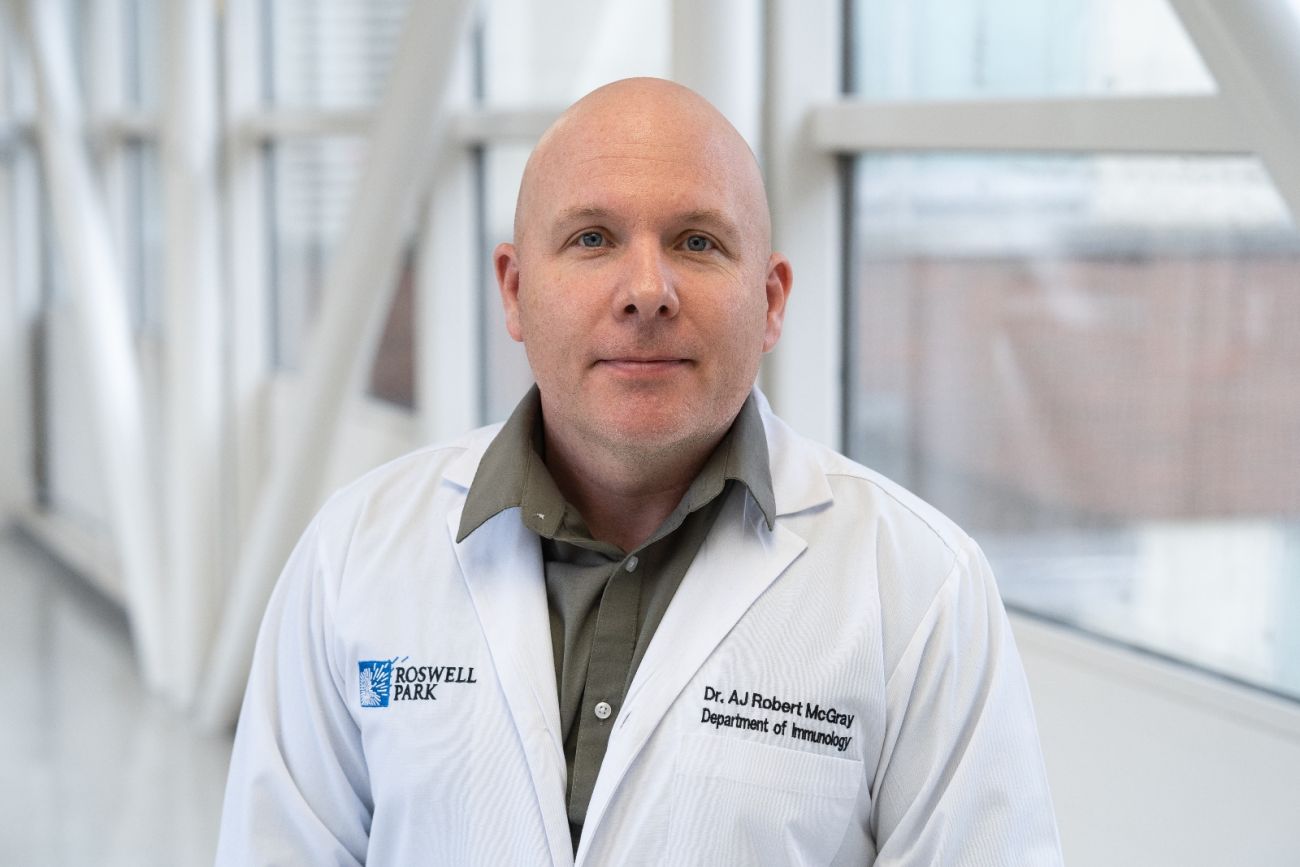Preclinical research at Roswell Park employs bispecific T-cell engagers delivered using engineered T cells
- Treatment targets FR⍺, an antigen commonly overexpressed in ovarian cancer
- Secreted engagers redirect host T cells to strengthen antitumor immunity
- Findings to be featured in NCI Cancer Moonshot online seminar July 27
BUFFALO, N.Y. — Researchers from Roswell Park Comprehensive Cancer Center report that a new approach to immunotherapy could overcome some of the challenges of treating ovarian cancer by leveraging the power of endogenous (host) T cells using engineered T cells to deliver bispecific T-cell engagers. The research team believes this strategy could improve treatment outcomes in ovarian cancer, for which immunotherapy has been largely ineffective. Findings from their preclinical study lay the groundwork for a new approach to targeting folate receptor alpha (FR⍺), an antigen commonly present in epithelial ovarian cancer and associated with advanced disease, chemotherapy resistance and disease relapse.
The new study has been published in the Journal for ImmunoTherapy of Cancer (JITC). The bispecific T-cell engager-secreting T-cell technology was developed in the laboratory of A. J. Robert McGray, PhD, principal investigator and first author of the study and Assistant Professor in the Department of Immunology at Roswell Park. Emese Zsiros, MD, PhD, FACOG, Chair of Roswell Park’s Department of Gynecologic Oncology, was the study’s senior author.
The team’s findings suggest that this innovative therapy can have potent antitumor effects against ovarian cancer and holds promise for boosting immune responses in ovarian cancer patients. Their approach involves a twist on conventional adoptive T-cell therapy (ACT), in which the patient’s own T cells are removed from the body and in some cases modified or engineered to recognize cancer cells. The T cells are multiplied in the laboratory and then given back to the patient to mount an attack against the tumor. ACT immunotherapy can result in complete and lasting therapeutic responses — no evidence of disease after treatment — for patients with other types of cancer, but so far it has been less successful against ovarian cancer.
Previous research has shown that patients with ovarian cancer survive longer when their tumors have a robust accumulation of T cells. However, many of those T cells appear to be “bystanders” — T cells that don’t recognize cancer cells or contribute to the antitumor immune response. The research team’s new strategy of delivering T cells that secrete bispecific T-cell engagers results in not only activating the infused T cells but also redirecting the bystander T cells and increasing the overall attack on the tumor by T cells.
The Roswell Park investigators built their strategy around FR⍺, a tumor antigen (or target) commonly found on ovarian cancer cells. Using a technique called retroviral transduction, they created FR-B T cells, which secrete engagers that instruct T cells to home in on FR⍺-positive (FR⍺+) cancer cells.
“We believe that FR-B T cells have the potential to generate potent antitumor immune responses against ovarian cancer and may, in the near future, benefit patients who otherwise are not expected respond to immunotherapy,” says Dr. McGray. “We are excited to continue developing this T-cell therapy and are working to advance this strategy to a clinical trial in patients with ovarian cancer.”
The investigators studied the antitumor effectiveness of FR-B T cells using tumor samples from ovarian cancer patients, FR⍺+ cancer cell lines, and preclinical tumor models. They found that FR-B T cells:
- Efficiently destroyed FR⍺+ cell lines, targeted FR⍺+ ovarian cancer patient tumor cells, and rallied bystander T cells in the ovarian cancer tumor microenvironment by secreting T-cell engagers.
- Could actively persist outside the tumor for prolonged periods of time, secreting T-cell enagers to redirect endogenous T cells present in the tumor to drive the tumor attack.
Dr. McGray will discuss the study during the program “Improving Immunotherapy Strategies for Cancers,” July 27, 2023, from noon-1 p.m. EDT as part of the National Cancer Institute’s (NCI) online Cancer Moonshot Seminar Series. Preregistration is required.
The study was funded by the Roswell Park Alliance Foundation, the Ovarian Cancer Research Alliance (OCRA) and the NCI’s Ovarian Cancer Specialized Program of Research Excellence (SPORE) grant to Roswell Park and the University of Chicago.
###
From the world’s first chemotherapy research to the PSA prostate cancer biomarker, Roswell Park Comprehensive Cancer Center generates innovations that shape how cancer is detected, treated and prevented worldwide. Driven to eliminate cancer’s grip on humanity, the Roswell Park team of 4,000 makes compassionate, patient-centered cancer care and services accessible across New York State and beyond. Founded in 1898, Roswell Park was among the first three cancer centers nationwide to become a National Cancer Institute-designated comprehensive cancer center and is the only one to hold this designation in Upstate New York. To learn more about Roswell Park Comprehensive Cancer Center and the Roswell Park Care Network, visit www.roswellpark.org, call 1-800-ROSWELL (1-800-767-9355) or email ASKRoswell@RoswellPark.org.
Rebecca Vogt, Media Relations Specialist
716-845-4919; rebecca.vogt@roswellpark.org
